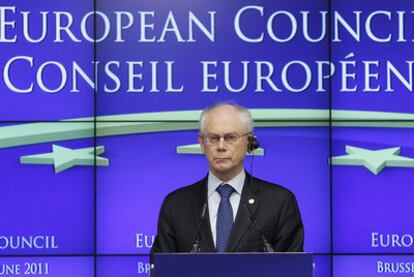Van Rompuy: "Spain's reforms can stop contagion"
European Council president to visit Spain for the fourth time on Tuesday
Herman van Rompuy is halfway through his term as the first permanent president of the European Council, which he began in 2010. The last 18 months of his mandate have been dominated by the most severe crisis to face the euro since its creation 12 years ago. His training as an economist and his previous experience as Belgium's budget minister have proved useful in coordinating the rescue packages for Greece, Ireland, and Portugal.
Van Rompuy has focused his efforts on bringing the leaders of France and Germany closer together, while trying to create greater cooperation between the other 25 members, most of whose leaders have proved reluctant to take the measures needed in the face of the crisis.
Van Rompuy visits Spain for the fourth time on Tuesday, and will meet with Prime Minister José Luis Rodríguez Zapatero, as well as the king.
But before that, Van Rompuy has called an emergency meeting of top officials dealing with the euro-zone debt crisis for Monday morning, reflecting concern that the crisis could spread to Italy, the region's third largest economy.
European Central Bank President Jean-Claude Trichet will attend the meeting along with Jean-Claude Juncker, chairman of the region's finance ministers, European Commission President José Manuel Durão Barroso and Olli Rehn, the economic and monetary affairs commissioner.
The talks were organized after a sharp sell-off in Italian assets on Friday, which has increased fears that Italy, with the highest sovereign debt ratio relative to its economy in the euro zone after Greece, could be next to suffer in the crisis. The details of a second international bailout of Greece will also be discussed, the sources said.
The spread of the Italian 10-year government bond yield over the benchmark German bund hit euro-lifetime highs of around 2.45 percentage points on Friday, raising the Italian yield to 5.28 percent, close to the 5.5-5.7 percent area which some bankers think could start putting heavy pressure on Italy's finances.
In the face of the mounting difficulties that the single currency faces, Van Rompuy insists "it is important to highlight the fact that this is not a crisis of the euro. The euro is a strong currency, and is built on solid economic foundations." He points out that the euro has "given Europe low and stable inflation levels, and that the United States and Japan have higher levels of public debt than the EU."
He blames the European and US banks for much of the current mess: "The excessive acceptance of risk by the banks and the lack of supervision and regulation by public bodies has played a role, along with market faults and political mistakes."
The continued worsening of the crisis has brought to the fore the extraordinary power of the ratings agencies. Last week Moody's downgraded Portugal's sovereign debt to junk status, angering many in the Iberian nation, including Portuguese Facebook users who are mobilizing to protest against the ratings agency.
Several new pages have been created on the social network appealing to users to intervene in creative ways, from establishing discussion forums to taking action against Moody's.
Van Rompuy says that the ratings agencies must accept their share of the blame: "They have made many mistakes, particularly as regards the subprime mortgage crisis that set in motion the current crisis," he says.
As regards Spain, which along with Italy and Belgium is seen as a likely target for the currency speculators, Van Rompuy says that this country's position "is completely different."
"Spain is facing difficult times, due to the collapse of the property bubble, but the reforms underway are the best means to protect against contagion and the best to produce economic growth and to create employment."

Tu suscripción se está usando en otro dispositivo
¿Quieres añadir otro usuario a tu suscripción?
Si continúas leyendo en este dispositivo, no se podrá leer en el otro.
FlechaTu suscripción se está usando en otro dispositivo y solo puedes acceder a EL PAÍS desde un dispositivo a la vez.
Si quieres compartir tu cuenta, cambia tu suscripción a la modalidad Premium, así podrás añadir otro usuario. Cada uno accederá con su propia cuenta de email, lo que os permitirá personalizar vuestra experiencia en EL PAÍS.
¿Tienes una suscripción de empresa? Accede aquí para contratar más cuentas.
En el caso de no saber quién está usando tu cuenta, te recomendamos cambiar tu contraseña aquí.
Si decides continuar compartiendo tu cuenta, este mensaje se mostrará en tu dispositivo y en el de la otra persona que está usando tu cuenta de forma indefinida, afectando a tu experiencia de lectura. Puedes consultar aquí los términos y condiciones de la suscripción digital.








































